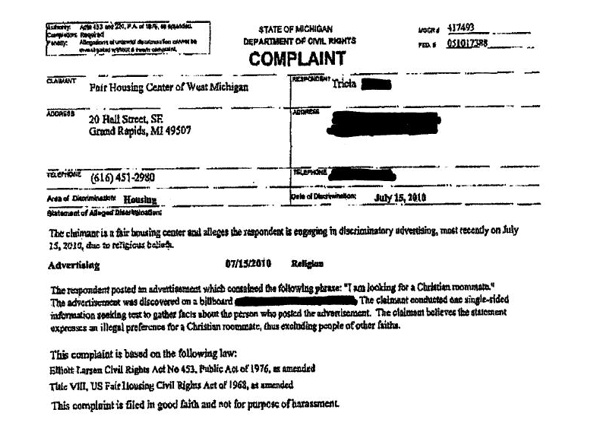
Woman seeks 'Christian roommate,' state cites her for discrimination
Bob Unruh - WND
A single, 31-year-old woman in Michigan who posted a note on her church bulletin board seeking a "Christian roommate" to share her residence has been cited by the state for violating the Fair Housing Act by discriminating against those of other faiths.
The complaint signed by Tyra Khan, a "Civil Rights Representative" of the state of Michigan Department of Civil Rights, surfaced when the Alliance Defense Fund announced today it was representing the woman.
ADF spokesman Joel Oster confirmed the organization sent a letter to the state explaining that such housing rules don't apply to people living in their own homes and wanting to share their resources.
Find how what happens when the government steps over the line, in "Constitutional Chaos"
"[Tricia] is a single lady looking for a roommate. She is not a landlord. She does not own a management company. She does not run an apartment complex. She is a single person seeking to have a roommate live with her in her house," the letter said.
"She is not prohibited by either federal law or state law from seeking a Christian roommate. Neither Title VII of the US Fair Housing Civil Rights Act of 1968 nor the Elliot Larsen Civil Rights Act No. 453 prevents a woman like [her] from seeking a Christian roommate."
|
|
The letter asked for an immediate dismissal of the case, but Oster confirmed to WND today that he had not received a response.
WND contacted the agency's spokesman, Harold Core, who said the case had been determined to be legitimate and the investigation was continuing.
 The complaint |
He cited a regulation from the U.S. Department of Housing and Urban Development, and explained the state of Michigan agrees to enforce federal regulations.
He said section 604C states it is a "violation to make, print or publish or cause to be made, printed or published any notice, statement or advertisement with respect to the sale or rental of a dwelling that indicates any preference" for a list of nondiscrimination categories, including religious belief.
The complaint specifically alleges the woman's statement, "I am looking for a Christian roommate," prevents people of "other faiths" from contacting the woman and making arrangements to share her home with her.
Core declined to respond to questions about the complications that could arise should a full range of nondiscrimination factors, such as race, age and sex, be applied.
"The Fair Housing law is very clear," he warned. "You cannot advertising for preferences on certain … situations."
"Free speech isn't the same as … a housing opportunity," he said.
"Christians shouldn't live in fear of being punished by the government for being Christians. It is completely absurd to try to penalize a single Christian woman for privately seeking a Christian roommate at church – an obviously legal and constitutionally protected activity," said Oster, a senior legal counsel with the ADF.
"Not content to just lock Christians and their beliefs into the four walls of their church or home, some groups also want to invade those walls and force their own ideas upon them by force of law," he said.
The person who filed the complaint, whose identity was being protected by the state, complained about the "advertisement which contained the following sentence: 'I am looking for a Christian roommate, ...' The claimant believes the statement expresses an illegal preference for a Christian roommate, thus excluding people of other faiths."
The state, which got the complaint from the Fair Housing Center of West Michigan, a private organization, ordered the defendant to provide information about her agent, the names and addresses of her management personnel, a copy of her anti-discrimination policy, addresses of her properties, tenants, witnesses and a copy of the advertisement.
The Fair Housing Center could not be reached for a comment.
The state also warned, "You must preserve all records relevant to this complaint until final disposition is issued by the department and until litigation and all appeals are concluded. Revelant records, would, for example, include records relating to the aggrieved person and all persons similarly situated."
Oct. 21, 2010
